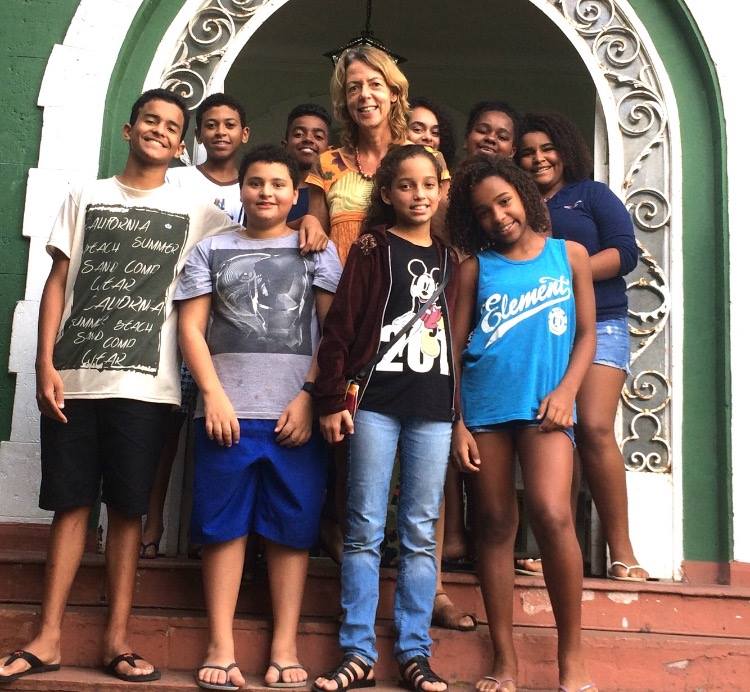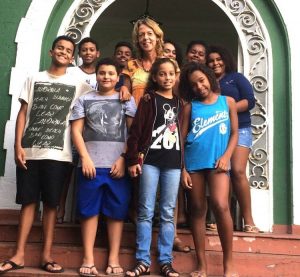Login
Signup
Positive Discipline: Connection vs. Correction

 Published on MultiRio, an educational medium for Rio de Janeiro on 11 October 2017, author Sandra Machado, translated by Karin von Malotki
Published on MultiRio, an educational medium for Rio de Janeiro on 11 October 2017, author Sandra Machado, translated by Karin von Malotki
Positive Discipline is a methodology developed by the US American Jane Nelsen, mother of 7 children, over 30 years ago, based on the theory of two Viennese scientists, Alfred Adler a psychology professor and his student Rudolf Dreikurs a psychiatrist. This approach is based on the firmness in education instead of punishment and is applied in 24 countries so far, including Brazil.
Since Jane´s visit in 2015 her books started to be published in Brazil, certifying workshops for educators are taking place as well as online and face-to-face courses for parents and teachers are being offered. The founders share the belief that when children feel connected to their family, school and community they live in, they tend to show fewer incidents of misbehaviour.
„Our society is changing. Family structures are more hybrid, there is more space for non conventional sexual expression and schools are starting to rethink their role in children’s education in the 21st century. Nowadays I can see individuals, families and schools in search of information that could help as a foundation for a society that expresses itself in a democratic, creative and dynamic way. Positive Discipline`s prime objective is teaching children and teenagers practical tools which help them develop into responsible and respectful citizens with internal resources, and turn them into a valuable contribution to society“ explains Fernanda Lee, “a Brazilian master in education specialized as a School Counselor from Point Loma Nazarene University.” Living in the USA with her husband and two children, who she considers her major teachers, Fernanda holds the position of international consultant on the Board of Directors of the Positive Discipline Association and is responsible for spreading the methodology amongst Brazilians.
Benefits are reaching children and teenagers in Rio de Janeiro
In order to better understand how Positive Discipline works the portal MULTIRIO interviewed Diana Nijboer, the Dutch founder and director of the NGO EduMais. With a Bachelor’s degree in Human Resources Management and a Master in Science in Business Administration, Diana was used to train and coach executives in Europe and the Middle East. „I always felt passionate about human development. In 2012 I came to Rio de Janeiro with my husband and fell in love not only with the city but even more with its children in the communities. I found them so intelligent, full of life and resilience, which motivated me to create more opportunities for them.“
When she did not find a formal employment, Diana started volunteering in different organisations like at the former orphanage Casa do Caminho located in Xerém, within the county of Duque de Caixas, where she was giving English and Dutch classes. Through the contacts she made Diana had the pleasure to meet Glenda Montgomery four years ago, who was a lead training in Positive Discipline. She deepened her knowledge about the methodology and was tutored by Glenda at the same time. Diana was also very lucky to be able to physically use a part of the school Solar Meninos de Luz, which is located in the community of Pavãozinho and lies between the neighbourhoods Copacabana and Ipanema. This is where she started working on the NGO she founded last year. As the school ranges from nursery to middle school, she got the opportunity to train the teachers of this institution.

Positive Training in Action for Teachers of Solar Meninos de Luz. Exercise Encouragement vs Enabling.
Patience and persistence are fundamental
Diana explains that no miracles exist which will make changes happen from one day to another. „There is a lack of discipline in Brazil“. We always use the phrase: „I need you to listen to me“ even though it would be easier to say „stay quiet“. When you tell a child what not to do, it is not clear for him/her what he/she is supposed to do. Furthermore it is not respectful. If I start a sentence with „I need you to…“ I show respect, first of all to myself. I work with children from the community, all students from public schools, and I also conduct workshops with their parents, who were brought up by and are used to receiving orders. We are trying to develop socio-emotional competencies instead, which can help them to obtain more self-control, self-reflection and recognise the responsibility that lies in their behaviour.
When a student insists in chatting during class, there is a standard procedure. „We ask the student to leave the room with us and say: I realised you keep on talking. What is it that makes you continuously doing this? Most of the times the student blames his neighbour. Then we respond: but you keep on answering. Sometimes they say: I am used to doing this. Then we offer options: Either you manage to keep quiet or would you prefer to sit somewhere else? We knee or sit down in front of them so they seem taller than us, which is a way of saying we are alike in terms of respect and dignity. With time we realise that their behaviour improves and they even help each other. The biggest impact is seeing them build the skill and patience to wait.“
It is also about freeing the children from a type of conditioning. „We want them to be conscious about the impact of action and reaction, creating the habit to stop and think before reacting automatically. Self-control is important because a confused mind does neither process information right away nor has the capacity to memorize, which is really inhibiting for the learning process. The children in the community are traumatised because they have no sense of security, as from one moment to another a conflict can arise here. They are exposed to low hygiene, drugs, arms and inappropriate sexual behaviour, which generates toxic stress for them and affects their brain development and behaviour. The more they learn to handle their emotions the better they will be able to lead their lives. We need to help these children grow, including serving them as a role model.

Yoga for kids in the After-School Program
First comes connection, and only thereafter correction
„I can say: it seems like you are very frustrated. This way I show empathy for the other person’s emotional situation without judging it. Everybody needs to be seen and heard, as well as acknowledgement for his or her emotions. But the most important matter is the way of connecting to each other. It is possible to benefit from Positive Discipline no matter at what age, even with the youngest ones“ she explains. To cope with all the work Diana can count on 17 volunteers, most of them being from Great Britain (five), but also from New Zealand, the USA, Italy, the Netherlands, Sweden and Peru who all speak basic Portuguese and range from 19 years until middle age. „We even have some Brazilians in the team, but most of them come from abroad, because the culture of doing social work is mainly spread in Europe. Finding volunteers was never a problem. After all my background lies in recruitment.“ she jokes.
Even the shiest students start to let go by constantly hearing encouraging words like „I know you can do it“. „We want these children to be problem solvers in the future“ Diana sums up. There is another phrase, which helps solving the problem of inappropriate behaviour, „this is not the way we do things here“. According to the Positive Discipline philosophy a child who misbehaves, is actually someone who needs encouragement. How is that possible? „Connect before correct“ repeats Diana.
The approach to choose connection over correction can be applied in a very simple way, for example by asking a child which is his or her favourite football team. Whenever needed this connection just needs to be focused on again. „I can connect with a misbehaving child and say to him: Flamengo, because this is our secret tool which we agreed upon to use when he starts misbehaving, look at this drawing“, and it always works. Everybody needs to feel connected. The key is to find out what is important to this person.
Diana interviews the parents of each child that joins her courses and even invites them to participate in workshops on different topics. „Even if they do not understand exactly what we are talking about, we have one common purpose which is a better future for their children, and therefore they let them stay with us. I tell them: Don’t beat your children. By doing this you are teaching them to do the same thing.“
There are also appropriate techniques to handle children on a daily basis when they feel agitated. „We tell them that we need them to be quiet and we are going to wait until this happens. The volunteers and I stay silent, watch the ceiling and just wait. At the beginning it takes a long time, but now the positive feedback comes quickly. Quietness is the most powerful tool of all. After all they are just trying to get attention, which means they want to connect. It is very concerning when parents say they will take their children to see a doctor because they must have some sort of disorder and they need medication. There is nothing wrong with these children!“ emphasizes the educational professional.
Diana has a very critical view on traditional educational methods. „We focus on academic competencies and forget about competencies for life. Forming responsible adults – this is Education. If we give tasks to children they see a purpose in what they do and feel recognised. I realize that there is a cultural problem in Brazil – there is always someone else doing a task for you, but this is not the best way.
Leave a Comment:
Je moet ingelogd zijn op om een reactie te plaatsen.